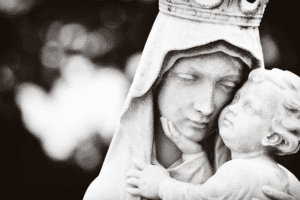 Wash your hands! Watch your distance! Don’t touch anything or anyone!
Wash your hands! Watch your distance! Don’t touch anything or anyone!
Over the last two years, we have taken our hygiene to the next level—and many continue to worry that the air around them is germ-filled and dangerous. We’re now used to masking up, and we’ve learned to pump the Purell at every turn. We’ve prided ourselves in becoming professional sanitizers!
Prudent hygienic measures are, of course, more important these days. However, if our focus is obsessively outward while an invisible “virus” called sin attacks our souls, we act just as the Pharisees did in Jesus’ time. These high priests were only concerned about their squeaky-clean public images. Jesus rebuked them, saying, “Blind Pharisee! First clean the inside of the cup and dish, and then the outside also will be clean.” (Matthew 26:23)
To be a child of God is why we were created; it’s the very purpose for which we exist. And, as His children, He adores us and longs to be in a relationship with us. But the fact is, sin separates us from our heavenly Father. God does not want us to “socially distance” ourselves from Him! He is the perfect gentleman who patiently waits for our return with abundant mercy and love. And, our beautiful Catholic faith gives us the ideal tool to cleanse ourselves; the Sacrament of Confession.
I know, yikes. Isn’t that an antiquated practice we Catholics washed our hands of at least a generation ago? Why should I tell some less-than-perfect priest my business (and how embarrassing!)? Why can’t I atone for my sins directly with the Man upstairs? In “From Sorrow to Joy, A retreat Guide on the Sacrament of Confession,” written by Fr. John Bartunek, LC, he explains, “Sin is real, and it is destructive—this was one of the messages contained in Christ’s passion and crucifixion, a visible icon of what sin does to the human person and the world. God knows this better than any of us, and he wanted to give us a place to go for healing. We cannot recover from sin and its destruction all by ourselves. Only God forgives sin; only God can repair the spiritual damage done by sin. Only God can heal the soul wounded by sin. And the sacrament of confession is the privileged, God-given arena for that forgiveness, reparation, and healing to take place.”
The Catechism says, “Sin creates a proclivity to sin” (1865). So, we should make an effort to visit the confessional regularly. Fr. Bartunek goes on to say, “Acknowledging our sinfulness, our weakness, and our need for God’s grace takes humility and courage. We have to take ownership of our sins and failures. The more attached we are to sin, to selfishness, and to worldly treasures like wealth, success, and reputation, the harder it is to be humble and courageous enough to admit our brokenness and need for redemption.” God does not want us to be stuck in “spiritual death.” Instead, God gives us a path to renewed life in the spirit. Cleansing ourselves routinely of minor sins gives us a fresh start and keeps us from becoming numb to the garbage piling up in our souls.
Our almighty God wants to be one with us! He is calling us to Himself and has the power to transform us into His likeness and image. Amazing! Just think; Jesus turned water into the finest wine.
They did so, and the master of the banquet tasted the water that had been turned into wine. He did not realize where it had come from, though the servants who had drawn the water knew. Then he called the bridegroom aside and said, “Everyone brings out the choice wine first and then the cheaper wine after the guests have had too much to drink; but you have saved the best till now.” (John 2:9-10)
He raised Lazarus from the dead.
Now when He had said these things, He cried with a loud voice, “Lazarus, come forth!” And he who had died came out bound hand and foot with graveclothes, and his face was wrapped with a cloth. Jesus said to them, “Loose him, and let him go.” (John 11:43-44)
And, every day, all around the world, Jesus changes simple bread into His very own body and blood.
While they were eating, Jesus took bread, and when he had given thanks, he broke it and gave it to his disciples, saying, “Take and eat; this is my body.” (Mt 26:26)
Just as that plain-old stale-ish tasting bread becomes our Lord and Savior through the miracle of transubstantiation, we too can be transformed. The Sacrament of Confession, and the grace it pours out, has the power to heal our spiritual illness and convert us from sinner to saint.
Much as we try, the messy and infected world around us is largely impossible to control, but we have a choice regarding our interior domain—the inside of the cup. Divine Mercy Sunday is right around the corner, so don’t pass up the chance to make a good Confession. Unmask your heart, and you will emerge plague free—shining and immaculate.
How precious is your mercy, O God! The children of Adam take refuge in the shadow of your wings. They feast on the rich food of your house; from your delightful stream you give them drink. For with you is the fountain of life, and in your light we see light. Show mercy on those who know you, your just defense to the upright of heart. (Psalm 36: 8-11)
You can make your own short and private retreat by downloading “From Sorrow to Joy, A retreat Guide on the Sacrament of Confession”.



